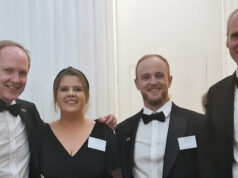Richard Morgan, International Government Relations Advisor at Anglo-American, describes his role as: “Cross-checking engagement and reputation. It’s the whole politics around the benefits from what we do.”
These are interesting times at Anglo. In April, Mark Cutifani replaced Cynthia Carroll as the CEO. But, says Morgan, the change on top will not make a huge difference: “I am sure that a lot of the values that Cynthia stood for, Mark will underline as well. We’ve always been associated with building for the longer term. Therefore, Mark needs to strike that balance between maximising returns as well as guarding sustainability.”
Recently, diamonds has moved up Anglo American’s agenda, mainly due to growing consumer demand in China and India. Last summer the company increased its shares in De Beers to 85 per cent (up from 40 per cent). The remaining 15 per cent is owned by the government of Botswana, home to some of the largest diamond deposits in the world.
Currently, profits from the diamond sector constitute between five and ten per cent of the company’s income, but Mr Morgan sees a potential for more: “There is a good demand for natural diamonds of gemstone quality and there isn’t a huge supply.”
As diamond prospects improve, demand for platinum has stayed low. Morgan believes that although the current situation in platinum industry is challenging, overall the future looks bright for South Africa.
He insists that Anglo American is committed to the country: “Fifty per cent of our business remains in South Africa. We continue to invest considerable amounts there in all of our business units – coal, diamonds, iron ore, and platinum. There is no sense that we are in any way trying to turn our back on South Africa.”
Morgan believes South Africa does not use their enormous natural wealth to its full potential; mining constitutes only six per cent of their GDP: “I would expect them to try to do more with that wealth. We could do more manganese, we could do more iron ore. There is more that could be done in South Africa than is currently being done.”
Morgan emphasises how during last year’s strikes, Anglo American faced protests at some of its mines and recognised the need for an expanded social labour programme in the platinum industry, including improved housing and equity share programmes for employees. Mark Cutifani wants to see more engagement with the communities, and Morgan explains that a percentage of the business will be made over to the workforce: “We need to ensure that there is an improvement in [the] well-being of communities, and a sense of ownership that makes the licence to operate a firm one.”
Morgan is optimistic about the platinum industry over the long term: “It is a strategic mineral, so I think there would be a future for it. The question is – in what quantity and what price…You need to keep your costs pretty tight if you are to have a sustainable future in mining platinum.”
He mentions that Anglo American’s internal report suggested that the company would have to cut 14,000 jobs across the platinum sector. “But we would then create 14,000 extra jobs through job-creation schemes and so on. It is very much the case of social responsibility that if you are going to have to rationalise business operations, that you put in place something else that will make up for it,” says Morgan.
However, in light of recent development things appear to have moved on. The latest reports suggest that Anglo plans to shed 6000 jobs, but there is not much news on any redeployment of this labour.










